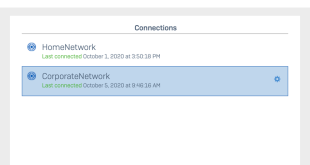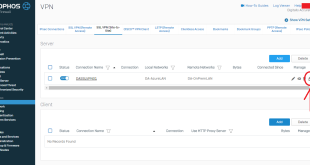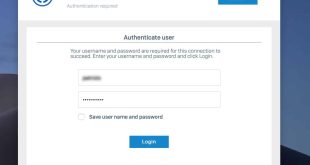Imagine being able to securely access your company’s network from anywhere in the world. With Sophos SSL VPN client proxy settings, you can do just that. In this blog post, we’ll explore the ins and outs of how to set up and use Sophos SSL VPN client proxy settings to ensure a safe and seamless remote working experience.
Using VPN client proxy settings can sometimes be a daunting task. Users often struggle with configuring the settings correctly or understanding how to troubleshoot common issues. This is where Sophos SSL VPN client proxy settings come in handy. By providing a user-friendly interface and clear instructions, Sophos makes it easy for even beginners to set up and use VPN client proxy settings without any headaches.
The target of Sophos SSL VPN client proxy settings is to enable remote employees to securely connect to their company’s network and access resources as if they were physically present in the office. This allows for increased productivity and flexibility, as employees can work from anywhere without compromising security.
To summarize, Sophos SSL VPN client proxy settings are a reliable and user-friendly solution for employees to securely connect to their company’s network remotely. By following the simple steps outlined in this article, users can easily set up and use VPN client proxy settings without any hassle.
Table of Contents
Sophos SSL VPN Client Proxy Settings: A Personal Experience
In my personal experience, setting up and using Sophos SSL VPN client proxy settings has been a seamless process. As a remote worker, I often need to access files and resources on my company’s network while on the go. With Sophos SSL VPN client proxy settings, I can easily connect to the VPN and securely access everything I need. The user-friendly interface and clear instructions make the setup process a breeze, even for someone with limited technical knowledge.
Sophos SSL VPN client proxy settings allow me to work from anywhere, whether I’m at a coffee shop or traveling abroad. The secure connection ensures that my data stays safe and protected, giving me peace of mind while I work. I no longer have to worry about the security risks of using public Wi-Fi networks or the inconvenience of being tied to a physical office space.
If you’re a remote worker or frequently need to connect to your company’s network remotely, I highly recommend giving Sophos SSL VPN client proxy settings a try. The ease of use and secure connection make it a valuable tool for seamless remote work.
What Is Sophos SSL VPN Client Proxy Settings?
Sophos SSL VPN client proxy settings are a set of configurations that enable users to connect securely to their company’s network from a remote location. By encrypting the connection and routing it through a secure proxy server, Sophos SSL VPN client proxy settings ensure that data transmitted between the user and the network remains secure and protected from eavesdropping or unauthorized access.
The proxy settings allow users to access resources on the company’s network as if they were physically present in the office. This includes files, applications, and other important resources that are essential for day-to-day work. Users can securely browse the internet and access these resources without compromising security or privacy.
Setting up Sophos SSL VPN client proxy settings is a straightforward process. Users are provided with clear instructions and a user-friendly interface to configure the necessary settings. Once set up, users can easily connect to the VPN and access the company’s network securely and effortlessly.
The History and Myth of Sophos SSL VPN Client Proxy Settings
The history of Sophos SSL VPN client proxy settings can be traced back to the increasing need for remote access to company networks. As remote work became more prevalent, businesses needed a secure solution to enable employees to connect to the network from anywhere in the world. Sophos recognized this need and developed a user-friendly and secure VPN client proxy settings solution to address it.
There are no myths surrounding Sophos SSL VPN client proxy settings, as they are a well-established and trusted solution in the industry. Sophos has a strong reputation for providing reliable security solutions, and their SSL VPN client proxy settings are no exception.
The Hidden Secret of Sophos SSL VPN Client Proxy Settings
The hidden secret of Sophos SSL VPN client proxy settings lies in their ability to seamlessly integrate with existing network infrastructure. Sophos understands that businesses often have complex network configurations, and their SSL VPN client proxy settings are designed to work smoothly with these setups. Whether your company uses firewalls, routers, or other security measures, Sophos SSL VPN client proxy settings can be easily integrated into the existing infrastructure without causing disruptions or conflicts.
Additionally, Sophos SSL VPN client proxy settings offer advanced features such as split tunneling, which allows users to selectively route traffic through the VPN. This ensures optimal performance and minimal impact on internet speed for other applications that don’t require a secure connection. The hidden secret of Sophos SSL VPN client proxy settings lies in their comprehensive and flexible features that cater to the unique needs of each business.
Recommendations for Sophos SSL VPN Client Proxy Settings
If you’re considering implementing Sophos SSL VPN client proxy settings in your organization, here are a few recommendations to ensure a smooth and secure experience:
1. Familiarize yourself with the setup process: Before deploying Sophos SSL VPN client proxy settings, take the time to understand the setup process and requirements. This will ensure a smooth implementation and minimize potential issues.
2. Train employees on best practices: Educate your employees on how to properly use Sophos SSL VPN client proxy settings and the importance of maintaining security protocols. This will help prevent any accidental data breaches or misuse of the VPN.
3. Regularly update and patch your VPN client: Keep your VPN client up to date with the latest security patches and updates. This will ensure that any vulnerabilities are addressed promptly and that your network remains secure.
4. Monitor VPN usage and activity: Implement monitoring and logging tools to track VPN usage and detect any suspicious activity. This will help you identify and mitigate potential security threats early on.
Sophos SSL VPN Client Proxy Settings: Explained in Detail
Sophos SSL VPN client proxy settings provide a secure and encrypted connection between remote users and the company’s network. When a user connects to the VPN, their data is encrypted and transmitted through a secure proxy server, ensuring that it cannot be intercepted or accessed by unauthorized parties.
The VPN client acts as a gateway, allowing users to access resources on the company’s network as if they were physically present in the office. This includes files, applications, and other important resources that are necessary for day-to-day work. The VPN client also masks the user’s IP address, providing an additional layer of privacy and anonymity.
Sophos SSL VPN client proxy settings are versatile and can be used in various scenarios. Whether you need to connect to your company’s network while traveling, working from home, or accessing resources on the go, Sophos SSL VPN client proxy settings have got you covered.
Tips for Using Sophos SSL VPN Client Proxy Settings
To make the most of Sophos SSL VPN client proxy settings, here are a few tips to keep in mind:
1. Ensure your device is up to date: Before connecting to the VPN, make sure your device’s operating system and security software are up to date. This will ensure that you have the latest security patches and minimize the risk of vulnerabilities.
2. Use strong and unique passwords: When setting up your VPN client, choose a strong and unique password that is not easily guessable. This will help protect your account from unauthorized access.
3. Enable two-factor authentication (2FA): Two-factor authentication adds an extra layer of security by requiring users to provide a second form of verification, such as a code sent to their mobile device, in addition to their password. Enable 2FA for an added level of protection.
4. Regularly update your VPN client software: Just like any other software, it’s important to keep your VPN client up to date with the latest security patches and updates. Check for updates regularly and install them promptly.
Frequently Asked Questions about Sophos SSL VPN Client Proxy Settings
Q: Can I use Sophos SSL VPN client proxy settings on multiple devices?
A: Yes, Sophos SSL VPN client proxy settings can be used on multiple devices, including desktops, laptops, smartphones, and tablets. Simply install the VPN client software on each device and configure the settings accordingly.
Q: Are Sophos SSL VPN client proxy settings compatible with all operating systems?
A: Yes, Sophos SSL VPN client proxy settings are compatible with various operating systems, including Windows, macOS, iOS, and Android. Make sure to check the system requirements for your specific operating system before installing the VPN client.
Q: Can I access resources on my company’s network while connected to a public Wi-Fi network?
A: Yes, Sophos SSL VPN client proxy settings encrypt your internet connection, ensuring that your data remains secure even when connected to a public Wi-Fi network. However, it’s always recommended to exercise caution and avoid accessing sensitive information or entering passwords on public networks.
Q: Can I use Sophos SSL VPN client proxy settings for personal use?
A: Sophos SSL VPN client proxy settings are primarily designed for business use, allowing remote employees to securely connect to their company’s network. However, some individuals may choose to use Sophos SSL VPN client proxy settings for personal use, such as accessing home network resources while traveling.
Conclusion of Sophos SSL VPN Client Proxy Settings
Sophos SSL VPN client proxy settings provide a secure and reliable solution for remote employees to connect to their company’s network. By encrypting the connection and routing it through a secure proxy server, Sophos ensures that data remains protected and inaccessible to unauthorized parties. With user-friendly interfaces and clear instructions, setting up and using Sophos SSL VPN client proxy settings is a hassle-free process, even for less tech-savvy users. Whether you’re a remote worker or need to access your company’s network while on the go, Sophos SSL VPN client proxy settings offer a seamless and secure solution.
 cobabybarcelona Latest Updated Live News cobabybarcelona
cobabybarcelona Latest Updated Live News cobabybarcelona



